Rajalakshmi Institute of Technology Admissions 2026
Application form FREE of Cost for a Limited Period of Time! | NBA & NAAC A++ Accredited | Highest CTC 44 LPA | Diamond rated by QS I-Gauge Indian College Rating
TNEA Lateral Entry Counselling 2025: The Directorate of Technical Education, Tamil Nadu, has commenced the TNEA lateral entry 2025 supplementary counselling on August 7, 2025. The authority has activated the TNEA lateral entry counselling 2025 link on the official website, tnlea.com. To access the registration, candidates will need their phone number and password. The last date to submit the TNEA 2025 lateral entry supplementary counselling is August 10, 2025. The provisional TNEA lateral entry 2025 round 3 seat allotment was released August 5, 2025. The tentative allotment for TNEA lateral entry 2025 was released on August 4, 2025.
Direct link to apply for TNEA 2025 supplementary counselling
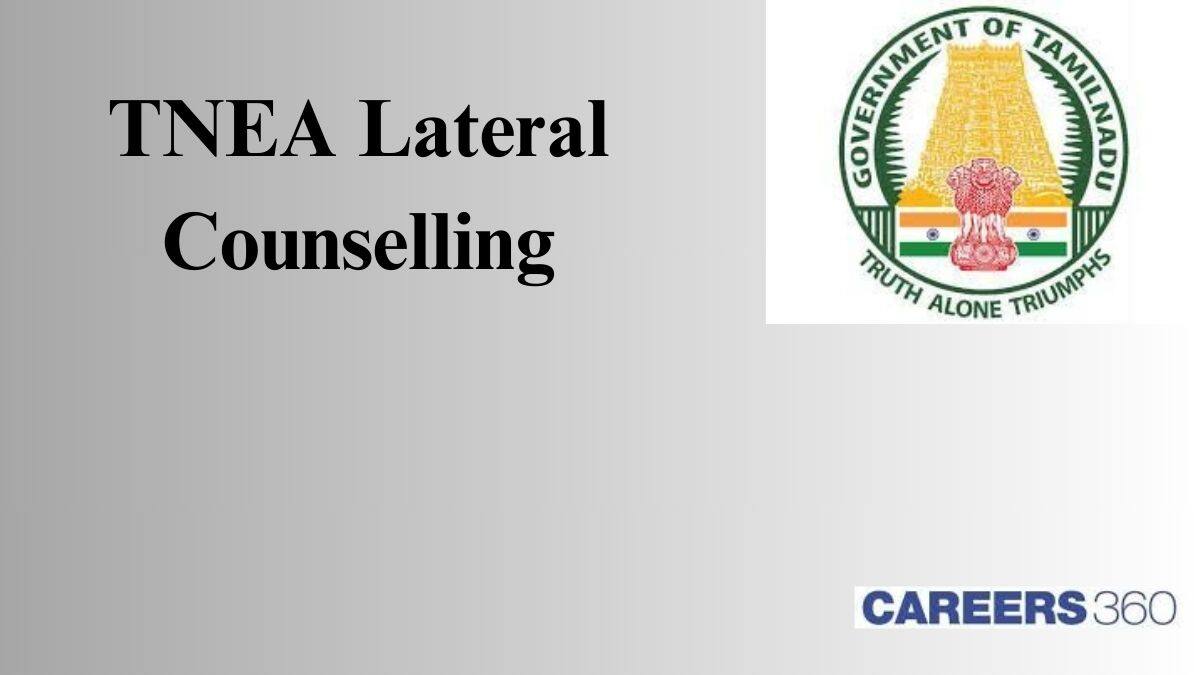
The TNEA 2025 lateral entry confirmation letter was relesed on July 31, 2025 after 5 PM. The authority has announced the tentative TNEA 2025 lateral entry round 2 seat allotment on July 31, 2025. The provisional TNEA lateral entry 2025 round 2 seat allotment will be announced on August 1, 2025. The TNEA lateral entry 2025 round 2 choice filling was conducted from July 29 to 30, 2025.
The provisional TNEA lateral entry 2025 round 1 seat allotment was released on July 28, 2025. To download the seat allotment, candidates will need their phone number and password. The tentative TNEA 2025 lateral entry seat allotment was released on July 27, 2025. The counselling process comprises registration, application filing, payments, certificate uploading, certificate verification, choice filling, seat allotment and confirmation.
Application form FREE of Cost for a Limited Period of Time! | NBA & NAAC A++ Accredited | Highest CTC 44 LPA | Diamond rated by QS I-Gauge Indian College Rating
Merit Scholarships | NAAC A+ Accredited | Top Recruiters : E&Y, CYENT, Nvidia, CISCO, Genpact, Amazon & many more
The TNEA lateral entry 2025 round 1 counselling registration was conducted from July 25 to 26, 2025. The special category selected candidates list for TNEA 2025 lateral entry was released on July 21, 2025. Candidates who wish to get admission to BE/BTech program through the lateral entry channel must participate in the TNEA Lateral Entry Counselling 2025.
The TNEA 2025 lateral entry rank list was released on July 17, 2025. To download the rank list, candidates will need their user ID and password. The TNEA Laternal Entry 2025 counselling registration was conducted from June 6 to July 5, 2025.
The exam conducting authority has released the TNEA Lateral entry important dates on the official website. For more details about the TNEA counselling schedule 2025 for Lateral entry, candidates can check the table below.
Events | Important Date |
Start date of registration | June 6, 2025 |
Start for certificate verification | June 6 to July 10, 2025 |
| Last date for Registration of Online Applications Last date for Uploading Documents | July 5, 2025 |
Declaration of ranks | July 17, 2025 (5:00 PM) |
| Special counselling | July 21 to 23, 2025 |
Choice filling | Round 1: July 25 to 26, 2025 Round 2: July 29 to 30, 2025 Round 3: August 2 to 3, 2025 |
Tentative allotment | Round 1: July 27, 2025 Round 2: July 31, 2025 Round 3: August 4, 2025 |
| Tentative confirmation | Round 1: July 27, 2025 Round 2: July 31, 2025 Round 3: August 4, 2025 |
| Provisional Allotment | Round 1: July 28, 2025 Round 2: August 1, 2025 Round 3: August 5, 2025 |
| Supplementary counselling | August 7 to 10, 2025 |
Before filling out the application form, applicants must check the documents and details required for TNEA Lateral entry counselling from below.
Name of the candidate.
E-mail ID.
Valid mobile phone number.
Community/Caste certificate.
Special Reservation Request Certificate.
Details of the registration fee to be paid through the Internet (Credit card / Debit card / Net banking details/UPI).
Aadhar number (Optional).
Academic details.
60+ Years of Education Legacy | UGC & AICTE Approved | Scholarship Worth 6 Crores | H-CTC 35 LPA
UG Admissions Open 2026 | Highest CTC 52 LPA | Average CTC 9.09 LPA | 60+ Collaborations with the world's best Universities
The counselling of TNEA lateral entry 2025 includes various steps.
Applicants must follow the steps to complete the TNEA lateral entry counselling registration as mentioned below.
TNEA 2025 counselling registration.
User Login.
Personal information.
Special reservation details.
Academic details.
Photo & signature uploading.
Payment of registration fees.
Uploading of Certificates.
Candidates can follow the steps to fill out the TNEA 2025 Lateral entry application form.
Step 1: Registration
The first step is to complete the registration process using basic details like the candidate's name, mobile number, email ID and others. Applicants also need to create a log in password. After filling in all the details in the TNEA 2025 lateral entry counselling registration form, candidates have to generate an OTP to verify all the details.
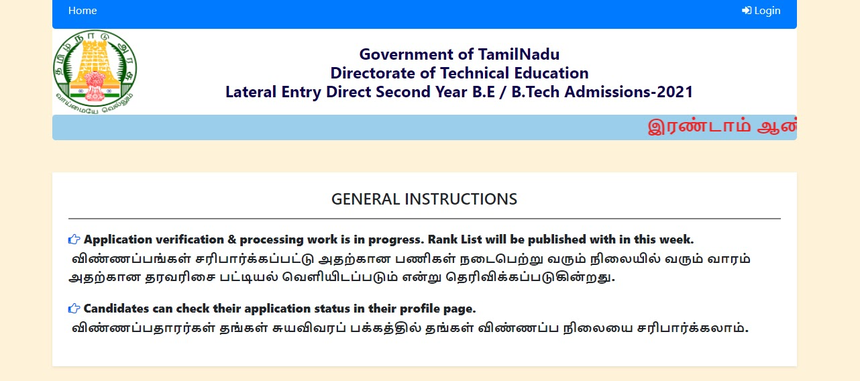

Step 2: User Login
After OTP verification, candidates have to log in using their mobile number and password.
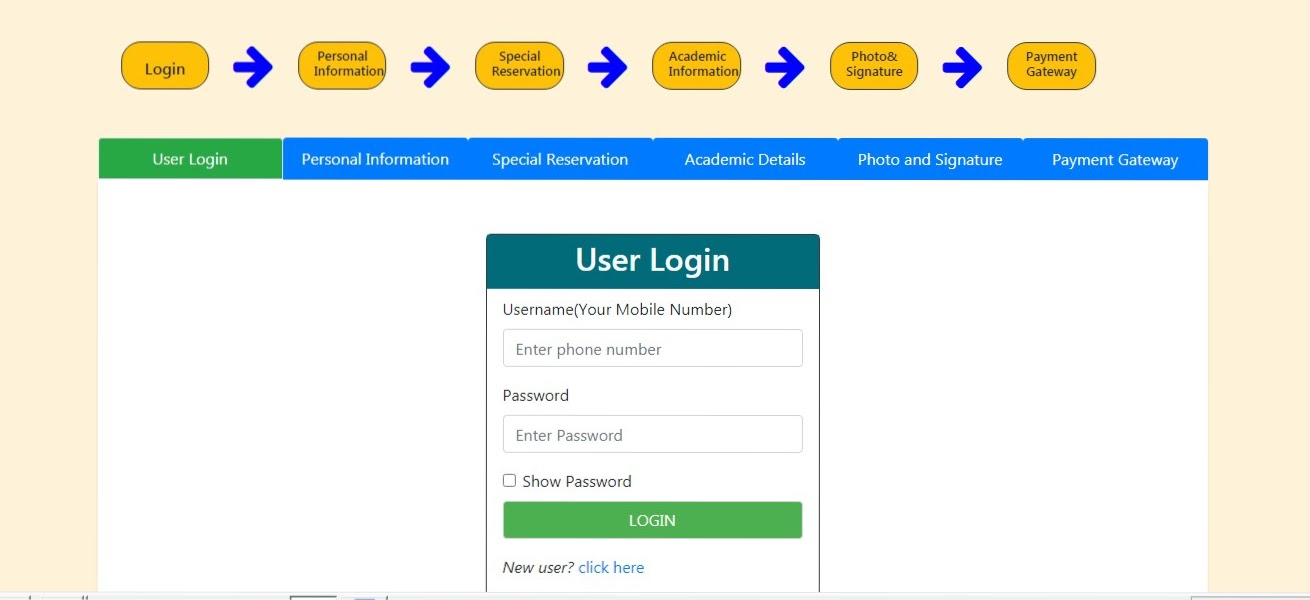
Step 3: Filing Personal Information
In the next step, candidates need to fill in the personal details in the required fields. The details required to be filled in the TNEA 2025 Lateral entry counselling form are the name of the parent/ guardian, gender, date of birth, citizenship, nativity, Aadhar number(optional), religion, community, caste, house address, village/city, taluk, district and pin code.
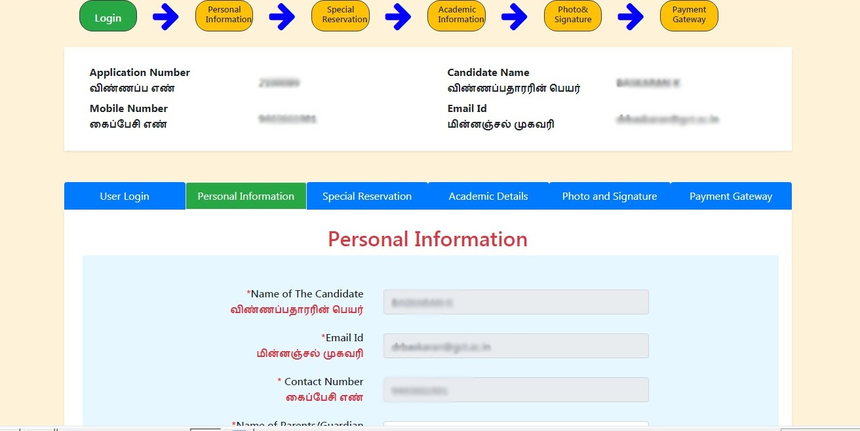
Step 4: Special Reservation
Candidates seeking reservations have to fill in the details in the required fields.

Step 5: Academic Details
The next step is to fill in the academic details in the application form of TNEA Lateral Entry Counselling 2025. The details required to be filled are group name, branch name, name of the polytechnic college studied, address of polytechnic college last studied, board of the college studied, Diploma/BSc Registration number, year of Passing, marks obtained and maximum marks.
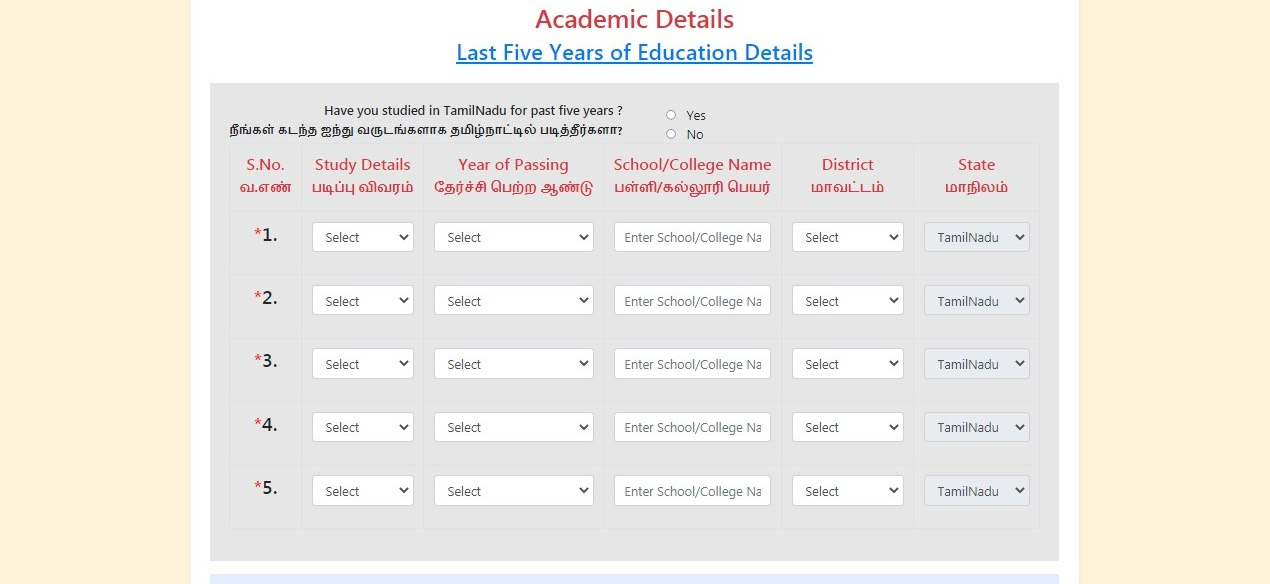
Step 6: Uploading photograph and signature
Now, candidates have to upload scanned images of photographs and signatures in the application form as per the specifications.
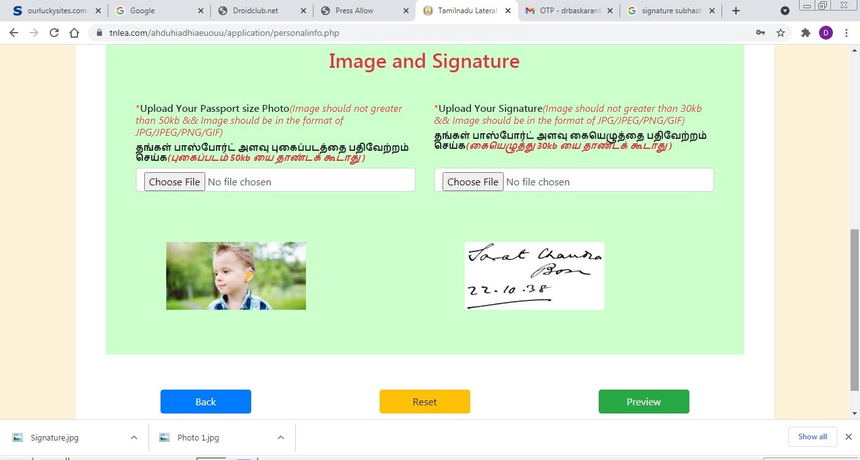
Step 7: Payment of application fee
The next step is to pay the application fee in online mode. The application fee for TNEA 2025 lateral entry is Rs 300 for general category candidates while reserved category candidates are exempted from payment of application fee.

Step 7: Uploading of Necessary Certificates
The final step is to upload all the necessary documents. The documents required to upload the application form are mentioned below.
10th Mark sheet.
Community Certificate.
Consolidated mark sheet.
Provisional certificate/Degree certificate.
Transfer certificate.
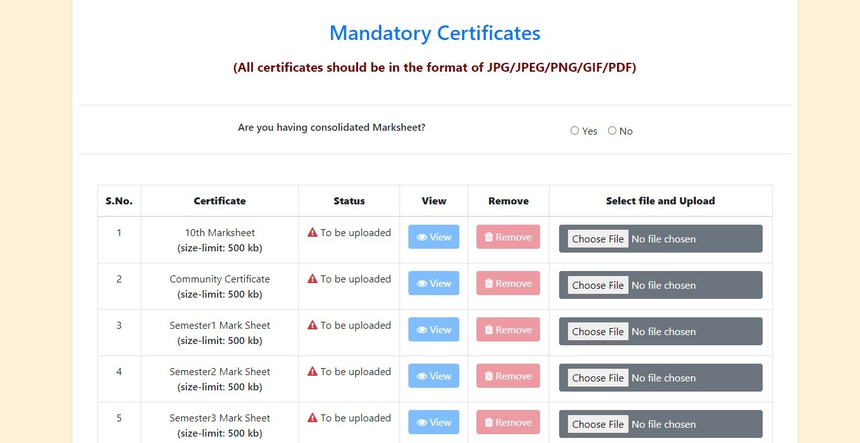
Applicants appearing for the TNEA lateral entry counselling 2025 must check the reservation criteria. Applicants having valid category certificates will be eligible for the reservation as per the rules.
Category | Reservation criteria |
Open Competition | 31.00 % |
Backward Class | 26.50 % |
Backward Class Muslim | 3.50 % |
MBC(Vanniyar) | 10.50% |
Most Backward Class & Denotified Communities | 7.00 % |
MBC | 2.50% |
Scheduled Caste | 15.00 % |
Scheduled Caste (Arunthathiyars) | 3.00 % |
Scheduled Tribes | 1.00 % |
TOTAL | 100.00 % |
Among top 100 Universities Globally in the Times Higher Education (THE) Interdisciplinary Science Rankings 2026
Recognized as Institute of Eminence by Govt. of India | NAAC ‘A++’ Grade | Upto 75% Scholarships
Highest CTC 44.14 LPA | UGC Approved | 1600+ Recruiters | 100% Placement
India's youngest NAAC A++ accredited University | NIRF rank band 151-200 | 2200 Recruiters | 45.98 Lakhs Highest Package
Last Date to Apply: 28th Feb | Ranked #43 among Engineering colleges in India by NIRF | Highest Package 1.3 CR , 100% Placements
NAAC A++ Grade | Recognized as Category-1 Deemed to be University by UGC | 41,000 + Alumni Imprints Globally